Página 232
two hundred thirty-two
UNIT 17
BEAUTY IS IN THE EYE OF THE BEHOLDER
A expressão beauty is in the eye of the beholder✚ indica que beleza é um conceito subjetivo, pois o que alguém acha bonito ou admirável pode não agradar outras pessoas.
I can't understand why she finds that place beautiful. But I suppose it's like they say: beauty is in the eye of the beholder.
1. Qual das frases a seguir se assemelha, em português, à expressão beauty is in the eye of the beholder? Comente com o colega mais próximo.
a ) Lindo ou linda de morrer.
b ) A beleza está nos olhos de quem a vê.
Resposta: Alternativa b.
Exchanging ideas
Agora, você vai conversar com o colega mais próximo sobre as questões a seguir. Virem-se um para o outro, ouçam as orientações do professor e iniciem a conversa.
1. Você concorda com a expressão beauty is in the eye of the beholder? Por quê?
2. A estátua da imagem foi produzida no início do século I. Quais padrões de beleza característicos da época ela reflete?
3. Seus gostos para cores, roupas, acessórios e lugares que considera bonitos são semelhantes aos de seu colega? Por que é importante haver diversidade de gostos e opiniões?
Professor, professora: Respostas e comentários nas Orientações para o professor.
Nesta unidade, você terá como objetivos:
- refletir e conversar sobre padrões de beleza;
- ler um poema e compreender as informações contidas nele;
- compreender e utilizar a passive voice;
- ouvir e compreender uma entrevista sobre a temática dos padrões de beleza;
- fazer um breve discurso sobre padrões de beleza.
Página 233
two hundred thirty-three
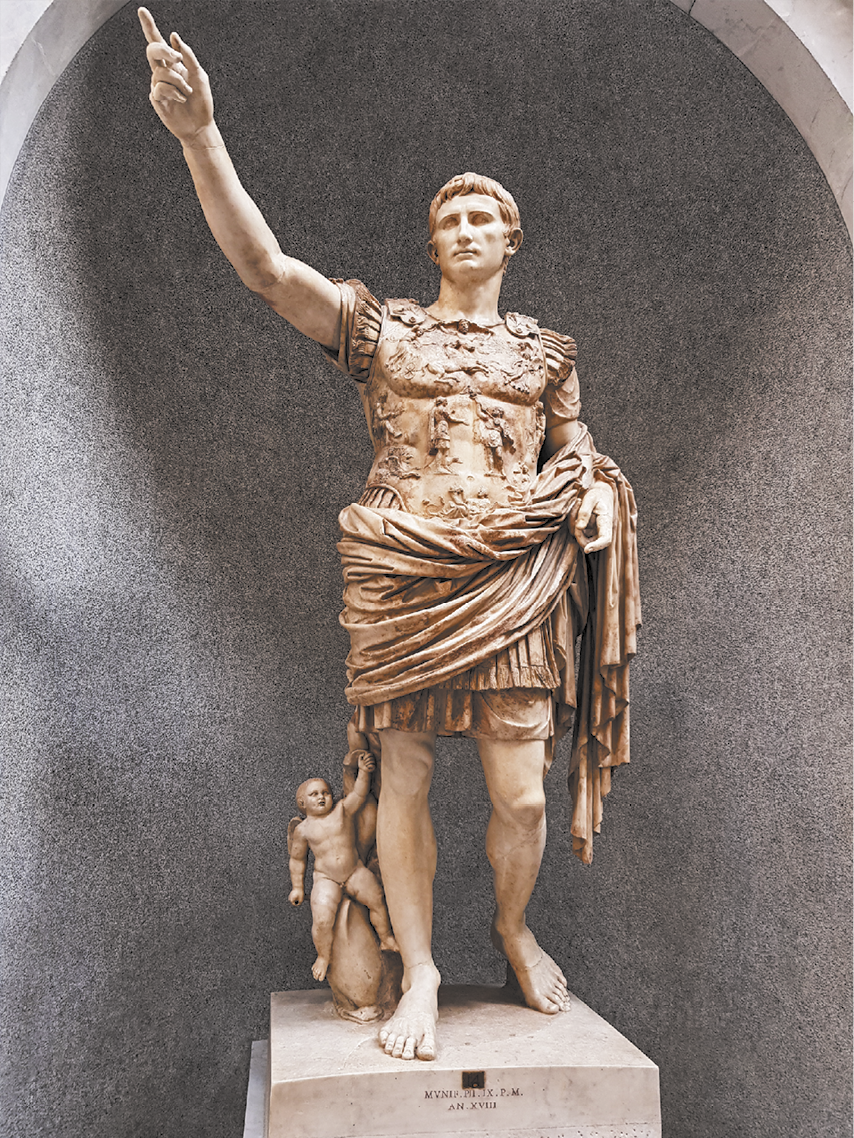
Página 234
two hundred thirty-four
Warming up
Beauty patterns
1. Para você, qual é a definição da expressão padrão de beleza?
Resposta pessoal. Aceite diferentes respostas para esta pergunta. É preciso reforçar que, em vez de discutir qual é o padrão de beleza que eles pessoalmente consideram ideal, o que a atividade demanda é que a expressão "padrão de beleza" seja explicada, de forma geral.
2. As obras de arte refletiram diferentes concepções de beleza ao longo da história. Pesquise informações sobre as imagens a seguir e relacione-as com as descrições corretas.
Professor, professora: As legendas das imagens não foram inseridas para não comprometerem a realização da atividade.
A.
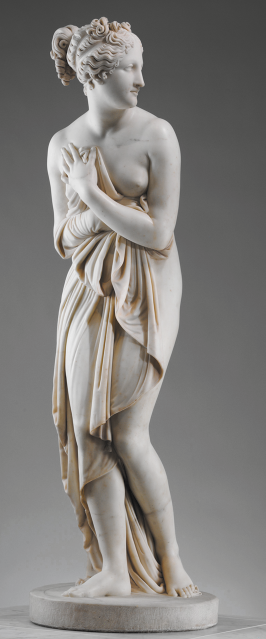
B.
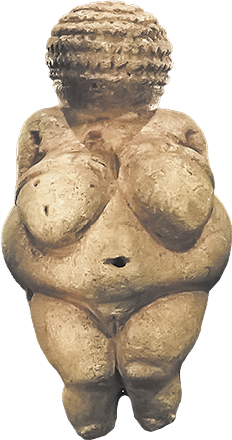
Imagens sem proporção.
I. The sculpture Venus Italica is made of marble✚ and dates back to the Neoclassical period. It was crafted by Antonio Canova between 1822 and 1823. It is located at the Metropolitan Museum of Art, in New York.
II. The Venus of Willendorf is a famous statuette of Paleolithic art. It was found in Austria and dates to around 28.000 B.C.E. It is located at the Natural History Museum, in Vienna.
Resposta: A – I; B – II.
3. De acordo com o que você pesquisou, o que essas obras de arte representam sobre o padrão de beleza em suas épocas?
Resposta: A Venus of Willendorf é uma figura feminina com características que enfatizam a fertilidade e a capacidade de gerar vida, como as formas volumosas de seu corpo. Nessa escultura, portanto, a ideia de beleza está associada à sobrevivência e à prosperidade da comunidade. A Venus Italica representa a deusa romana do amor e da beleza, Afrodite (ou Vênus). Nessa obra, a ideia de beleza é associada à perfeição estética, ao equilíbrio e à elegância, refletindo os ideais clássicos que valorizam a simetria e a proporção.
4. Responda às questões a seguir com um colega.
a ) Você conhece outras imagens que mostram diferentes concepções de beleza? Quais? Caso não conheça, pesquise imagens que evidenciam essas diferenças, mostre-as aos colegas e conversem sobre elas.
Resposta pessoal. Incentive os estudantes a procurar revistas, imagens que retratem outras épocas ou publicações em redes sociais que mostrem diferentes padrões de beleza.
b ) Na sua opinião, quais fatores contribuem para a mudança das concepções de beleza de uma época para outra?
Resposta pessoal. Oriente os estudantes a refletir sobre como os aspectos sociais e culturais de cada época podem influenciar na definição do que é considerado belo.
Página 235
two hundred thirty-five
Learning vocabulary
1. Leia os adjetivos e responda às questões.
- attractive
- cute
- good-looking
- gorgeous
- handsome
- hideous
- ordinary
- natural
- pretty
- ugly
- wonderful
a ) Quais desses adjetivos podem ser utilizados como sinônimos para a palavra beautiful?
Possível resposta: Attractive, cute, good-looking, gorgeous, handsome, pretty.
b ) Quais podem ser utilizados como antônimos de beautiful?
Possível resposta: Hideous , ugly.
2. Relacione as categorias a seguir com os adjetivos em inglês para descrever a aparência física.
A. age
B. height
C. build
I. chubby
II. curvy
III. older
IV. medium-height
V. middle-aged
VI. short
VII. skinny
VIII. stocky
IX. tall
X. teenager
XI. thin
XII. young
XIII. slim
XIV. fit
XV. overweight
Tip
Quando descrevemos as características físicas de uma pessoa, devemos seguir a sequência de adjetivos: general opinion, size, shape e age.
My grandmother is a beautiful medium-height thin older woman.
Resposta: A – III, V, X, XII; B – IV; VI; VIII; IX; C – I; II; VII; VIII; XI; XIII; XIV; XV.
Reading
Poem
Pre-reading
1.
Track 38 You are going to listen to
an extract from the
History Extra podcast, where
the host and the academic Corin Throsby discuss the life of Lord
Byron, one of the most important Romantic poets. Listen to the
conversation and answer the following questions.
a ) Lord Byron's first famous poem was written after he'd taken a gap year. What was it known as at his time?
I ) The Good Tour, the trip that lots of young noblemen took to marry a noble lady, and to see great art and antiquities.
II ) The Grand Tour, the trip that lots of young noblemen took to better their education, and to see great art and antiquities.
Resposta: Alternativa II.
b ) Where did Lord Byron go to on his trip?
I ) He went to France and Italy.
II ) He traveled to the East, all the way to Albania.
Resposta: Alternativa II.
c ) During his trip, Byron wrote the poem "Childe Harold's Pilgrimage". How was this poem received by readers at the time?
I ) It was a huge hit and it made him famous.
II ) It wasn't well received and it made him feel sad.
Resposta: Alternativa I.
Página 236
two hundred thirty-six
While reading
1. Read the poem written by Lord Byron and answer the following questions.
Professor, professora: Leia o poema em conjunto com a turma e faça pausas estratégicas para perguntar aos estudantes o que compreenderam. Permita o uso de dicionários para que eles esclareçam as principais dúvidas em relação ao vocabulário.
Tip
O poema utiliza palavras e formas que eram comuns no inglês antigo, mas que hoje são menos frequentes. Por exemplo, o advérbio thus nesse contexto pode ser traduzido como "assim" ou "dessa forma". Além disso, a palavra o'er é uma contração de over e foi usada para criar um ritmo no poema. Hoje em dia, over é a forma mais comum, e a contração o'er caiu em desuso.
She Walks in Beauty
I.
She walks in beauty, like the night
Of cloudless✚ climes and starry skies;
And all that's best of dark and bright
Meet in her aspect and her eyes:
Thus mellowed✚ to that tender light
Which heaven to gaudy✚ day denies.
II.
One shade the more, one ray✚ the less,
Had half impaired✚ the nameless grace
Which waves in every raven tress,
Or softly lightens o'er her face;
Where thoughts serenely sweet express
How pure, how dear their dwelling✚ place.
III.
And on that cheek, and o'er that brow,
So soft, so calm, yet eloquent,
The smiles that win, the tints✚ that glow,
But tell of days in goodness spent,
A mind at peace with all below,
A heart whose love is innocent!
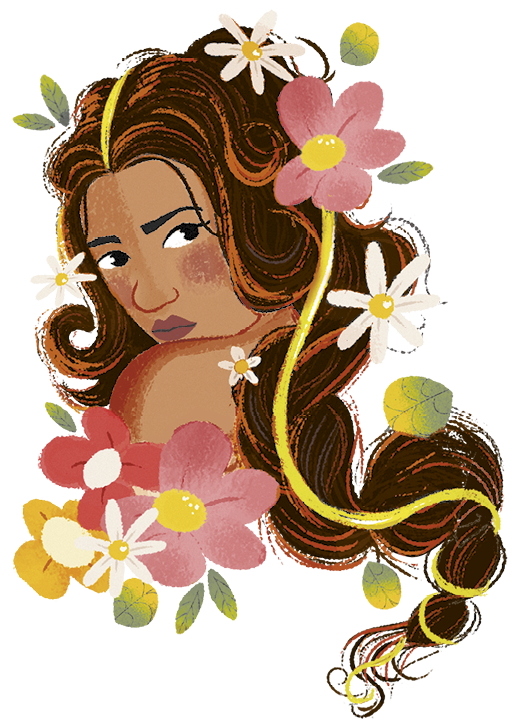
BYRON, George Gordon. She walks in beauty. Poets.org. Available at: https://s.livro.pro/i34cfy. Accessed on: June 26th, 2024.
a ) Stanzas✚ in a poem are grouped lines separated by a space. How many stanzas does the poem have?
Resposta: It has three stanzas.
b ) How many lines are there in each stanza?
Resposta: There are six lines in each stanza.
c ) Rhymes are words in which the final sounds match. What rhymes did you find in this poem? Write them down.
Resposta: As rimas são: I - night/bright/light, skies /eyes/denies; II - less/tress/express, grace /face/place; III - brow /glow/below, eloquent /spent/innocent.
2. What is the poem about? Give examples with fragments from the poem.
Resposta: The poem written by Byron is about feminine beauty. It praises both the physical and the inner beauty of the woman, as we can read, for example, in: "She walks in beauty, like the night"; "(…) the nameless grace/Which waves in every raven tress,"; "And on that cheek, and o'er that brow,/So soft, so calm, yet eloquent,/The smiles that win, the tints that glow," and "A heart whose love is innocent!".
3. Read the sentences and identify if they are true or false. Then, correct the false ones.
a ) The poem describes a good-looking woman walking during the day.
Resposta: False. The poem compares the woman's beauty to the night.
b ) The poem is about a woman who is as beautiful as a cloudless starry night.
Resposta: True.
c ) The poet uses metaphors to describe the woman's beauty.
Resposta: True.
d ) The woman described in the poem has an agitated and restless appearance.
Resposta: False. The woman described in the poem has a calm and innocent appearance. She looks serene, sweet and pure.
Página 237
two hundred thirty-seven
4. Read the first stanza again and answer the question.
She walks in beauty, like the night
Of cloudless climes and starry skies;
And all that's best of dark and bright
Meet in her aspect and her eyes:
Thus mellowed to that tender light
Which heaven to gaudy day denies.
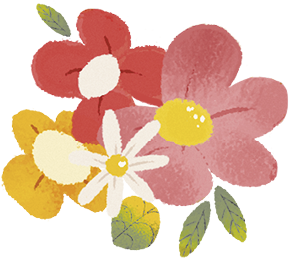
a ) What is the main idea in this stanza?
I ) It explains how much this woman is loved and how shy she is.
II ) It praises the woman's beauty, comparing her qualities to elements of nature.
Resposta: Alternativa II.
b ) How does the poem describe the woman's beauty?
I ) Using contrasting words such as dark and bright, night and day, light and gaudy. These contrasts express how beautiful the woman is.
II ) Using words that compare colors, always with a heavy tone. This darkness suggests that the woman is beautiful.
Resposta: Alternativa I.
5. Metaphors are used to describe something by comparing it to something else. How does the poem present its metaphors? Identify the correct option.
a ) The poem explains Lord Byron's way of life and his relationships, which means that the poem is realistic.
b ) The woman is described as a flower, which is the most common metaphor in Romantic poetry.
c ) The poem explains how the woman is delicate and ruthless at the same time.
d ) The poem uses contrast and compares the woman's beauty with natural elements, such as the cloudless climes and starry skies.
Resposta: Alternativa d.
Post-reading
1. Discuss the following questions with your teacher and classmates.
a ) In your opinion, what motivated Lord Byron to write about the theme of feminine beauty?
b ) Do you think that Lord Byron's poem makes sense nowadays? Why?
c ) Do you somehow relate to the feminine figure in the poem or with the feelings of the poetic persona? If so, how?
d ) Has this poem changed your point of view about the theme of beauty? Why?
Respostas pessoais. Comentários nas Orientações para o professor.
2. Research a Brazilian poet who wrote about beauty. Answers the following questions.
- Who is he/she and where is he/she from?
- When did he/she become a poet?
- Which literary period does his/her poems belong to?
- What did you most like about his/her poems?
Resposta pessoal. Comentários nas Orientações para o professor.
3. Read a poem about beauty written by the poet you chose in the previous activity. What did you learn about this theme in the Brazilian poetry? Share with a classmate.
Resposta pessoal. Após os estudantes lerem o poema que escolheram, incentive-os a pensar sobre o que aprenderam a respeito de como o tema beleza é abordado na poesia brasileira.
4. How was your understanding of the poem "She Walks in Beauty"? Was it difficult or not? Talk about it with your teacher and classmates.
Resposta pessoal. Incentive os estudantes a compartilhar as dificuldades que tiveram ao ler o poema e quais estratégias utilizaram para superá-las.
Página 238
two hundred thirty-eight
Comprehending and using
Passive voice
1. Leia os trechos dos textos a seguir e responda às questões.
[…]
Canadian model Winnie Harlow, born Chantelle Brown-Young, did not have an easy childhood. At the age of four she was diagnosed with vitiligo, an incurable skin pigmentation disease that causes colorless✚ patches✚ to develop on a person's body.
[…]
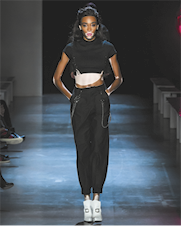
JAMSHED, Zahra. From 'cow' to cover girl, model Winnie Harlow is changing beauty standards. CNN, Jan. 8th, 2016. Available at: https://s.livro.pro/t3gmhb. Accessed on: Sept. 10th, 2024.
[…]
Tess Holliday is a plus-size model, published author, and well-known✚ figure in the body positivity community. […]
There is more room for plus-size women of many shapes, colors, and gender identities on the runways✚. Where are they?
"I'm the only model that looks like me that is at the level that I'm at," she says. "I know that a lot of it has been because I've had a lot of opportunities that weren't given to a lot of other people that look like me. Most of them are women of color, which is incredibly frustrating."
[…]
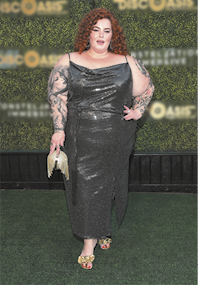
FORD, Ashley C. Tess Holliday's health is none of your business. Self, June 25th, 2018. Available at: https://s.livro.pro/c6wswa. Accessed on: Sept. 10th, 2024.
a ) Quem é Chantelle Brown-Young?
I ) It is Winnie Harlow's birth name.
II ) It is the name of the city where Winnie Harlow was born.
Resposta: Alternativa I.
b ) O que aconteceu com Winnie Harlow quando ela tinha quatro anos?
I ) She discovered that her childhood friend had an incurable disease.
II ) She was diagnosed with a skin pigmentation disease called vitiligo.
Resposta: Alternativa II.
c ) Quem é Tess Holliday?
I ) She is a plus-size model, a writer and a famous figure in the body positivity community.
II ) She is a journalist, an actress and a plus-size model who has had a lot of opportunities.
Resposta: Alternativa I.
d ) Segundo Tess Holliday, o que falta para outras modelos parecidas com ela alcançarem sucesso em suas carreiras?
I ) They need money. She had a lot of money to invest in brands and in the fashion market.
II ) They need opportunities. She's had a lot of opportunities that most models like her don't usually have.
Resposta: Alternativa II.
e ) Quando Tess Holliday fala de outras pessoas como ela, a quem ela se refere?
I ) She is talking about plus-size women of many shapes, colors and gender identities.
II ) She is talking about Caucasian women who fit the beauty standards of society.
Resposta: Alternativa I.
Página 239
two hundred thirty-nine
2. Leia os trechos extraídos dos textos e complete as frases.
At the age of four she was diagnosed with vitiligo […].
[…] I've had a lot of opportunities that weren't given to a lot of other people that look like me.
a ) The sentences are in the passive voice, which is used ■
I ) when the focus is on who performed the action. It's important to know who the doer of the actions is.
II ) when the focus is on the receiver of the action. We don't know or it is not important who the performer of the action is.
Resposta: Alternativa II.
b ) The sentences are formed by ■
I ) the appropriate form of the verb to be + the main verb in the past participle form.
II ) the appropriate form of the verb to be + the main verb with -ing.
Resposta: Alternativa I.
c ) In the passive voice, the auxiliary verb to be can be conjugated in all tenses. In these sentences, the verb to be is conjugated in the ■ tense.
I ) simple past
II ) simple present
Resposta: Alternativa I.
Activities
1. Analyze the following pictures of models. Then, match the sentences with the correct image. If necessary, carry out research about them.
Professor, professora: As legendas das imagens não foram inseridas para não comprometerem a realização da atividade.
A.
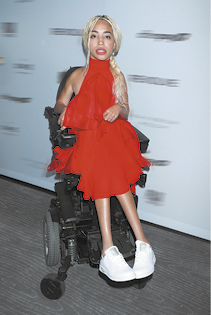
B.

C.
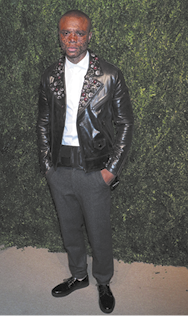
I. His name is Ralph Souffrant. He has a skin condition similar to vitiligo, causing his skin to be covered in freckles✚. He is a model and a dermatology student.
II. Her name is Paola Antonini. She had an accident in 2014, when she was hit by a car. She's a Brazilian model and a digital influencer.
III. Her name is Jillian Mercado. She was diagnosed with spastic muscular dystrophy✚ and uses a wheelchair. She's a model and a fashion blogger.
Resposta: A – III; B – II; C – I.
2. Rewrite the following sentences using the passive voice.
a ) Jillian Mercado starred in several campaigns.
Resposta: Several campaigns were starred by Jillian Mercado.
b ) The story of Paola Antonini inspired other women.
Resposta: Other women were inspired by the story of Paola Antonini.
c ) A photographer discovered Ralph Souffrant when he was 13.
Resposta: Ralph Souffrant was discovered by a photographer when he was 13.
Página 240
two hundred forty
3. Read the speeches and complete them with the passive voice. Use the past form of the verb to be and one of the verbs below in the past participle form.
- to develop
- to consider
- to perpetuate
- to showcase
- to create
- to immortalize
For me, men also struggle with beauty standards. It is changing now, but, when I was younger, a strong and muscular body ■ the ideal body shape for men. This led to health issues, for example, some men became obsessed with building muscles no matter what.

Resposta: was considered.
In my opinion, the obsession with being skinny and fit can have a devastating effect on women's mental health. In the past few years, for example, serious eating disorders ■ by girls all around the country.

Resposta: were developed.
Unrealistic beauty standards ■ by the media. But when more inclusive representations ■ by some brands, this started to change. I stand for this transformation and I think that everybody else should as well.

Resposta: were perpetuated; were showcased.
Many cultures have represented the concept of beauty in different ways through art. In previous centuries, famous paintings and sculptures ■ to capture and celebrate beauty. Many beautiful women ■ by works of art.

Resposta: were created; were immortalized.
4. Read the following sentences and change them to the passive voice.
a ) The students created a campaign about unrealistic beauty standards at school.
Resposta: A campaign about unrealistic beauty standards was created at school.
b ) The government announced new regulations for the beauty industry.
Respostas: New regulations were announced for the beauty industry.
c ) I bought these cosmetics and makeup for my mother.
Resposta: These cosmetics and makeup were bought for my mother.
d ) They developed a new product to make people look better.
Resposta: A new product to make people look better was developed.
5. Now, pair up with a classmate and write a dialog about beauty patterns. Use the passive voice and the following words.
- beauty
- elegance
- pretty
- to be
- to look
- to respect
- to love
Resposta pessoal. Auxilie os estudantes durante a escrita do diálogo. Se necessário, disponibilize dicionários para a turma.
Página 241
two hundred forty-one
Listening
Interview
Pre-listening
1. You are going to listen to part of an interview with Zozibini Tunzi, a South African model who was crowned Miss Universe in 2019. Before listening, answer the following questions.
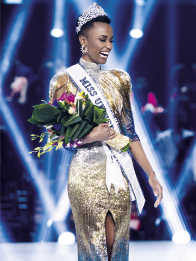
a ) Do you think that beauty pageants✚ should exist? Do you believe they are relevant? Why?
Resposta pessoal. É interessante refletir que, embora os concursos de beleza atuais aceitem uma variedade maior de tipos de beleza, a relevância dessa competição para a sociedade é questionável. Esses eventos podem reforçar ideias limitadas sobre o que significa ser bem-sucedido ou admirável, promovendo padrões de beleza que não representam a verdadeira diversidade das pessoas. É importante pensar sobre o impacto que essas representações têm em nossa compreensão de valor e sucesso.
b ) Do you think that beauty pageants reinforce stereotypes or contribute to inclusion? Talk to your classmates.
Resposta pessoal. Espera-se que os estudantes respondam que os concursos podem reforçar estereótipos ao valorizar um padrão de beleza específico.
While listening
1.
Track 39 Listen to the interview.
Which of the following words and phrases do you hear?
- light skin
- dark skin
- standards of beauty
- blond hair
- artificial hair
- look like
- beautiful women
- representation
- society
- message
- wear a wig
- wear a tiara
Resposta: Light skin; standards of beauty; artificial hair; look like; beautiful women; representation; message; wear a wig.
2.
Track 39 Listen to the interview
again and read the following statements. Identify if they are true
or false and correct the false ones.
a ) Zozibini Tunzi thinks that beauty pageants should stop today.
Resposta: False. Zozibini Tunzi thinks that the lack of representation of beautiful women who look like her should stop today.
b ) She says that there should be more beautiful women who look like her on magazines and on TV.
Resposta: True.
c ) When she was growing up, colorism was a big issue in her society.
Resposta: True.
d ) She says that the furthest women are away from light skin, the more beautiful they are considered.
Resposta: False. She says that the furthest women are away from light skin, the less beautiful they are considered, the furthest they are from beauty.
e ) She wants to get this message across because she believes that women and little girls do not relate to her.
Resposta: False. She wants to get this message across because she believes that women and little girls relate to her, they feel the same way about the lack of representation.
f ) During the competition, she was advised to wear a wig because her kind of hair was not considered a standard of beauty.
Resposta: True.
3. Explain in your own words why Zozibini Tunzi was advised to wear a wig to cover her hair and comment about her reasons to refuse to do it.
Possível resposta: She said that it was because her kind of hair has never really been a standard of beauty. So, she refused to do it because it was important for her to keep her natural hair; she felt that if she wore a wig, it would mean she believed that her hair was not worthy enough to be called beautiful.
Post-listening
1. How does Zozibini Tunzi's victory as Miss Universe challenge traditional beauty standards?
Professor, professora: Resposta e comentários nas Orientações para o professor.
2. Considering the situation that Zozibini Tunzi experienced, how do you think the organizer's stance in suggesting the use of a wig reflects the beauty standards promoted by beauty pageants?
Resposta pessoal. Comentários nas Orientações para o professor.
3. Even though beauty pageants such as Miss Universe can bring representation to different types of beauty, what are the implications of the existence of this type of pageant for the general perception of women's self-esteem? Talk to your classmates.
Resposta pessoal. Comentários nas Orientações para o professor.
4. How was your understanding of the audio? Talk about it with your teacher and classmates.
Resposta pessoal. Comentários nas Orientações para o professor.
Página 242
two hundred forty-two
Speaking
Speech
1. After studying about the concepts of beauty, did you change your opinion about beauty patterns? Why? Talk to a classmate about it. Follow these examples.
I haven't changed my opinion because...
Now, I have a different opinion about beauty patterns because...
Resposta pessoal. Este é um momento de reflexão para que os estudantes possam compartilhar o que aprenderam, se mudaram de ideia a respeito da definição de padrão de beleza deles etc.
2. In recent years, many brands have started campaigns promoting beauty diversity, including people of different body types, ages and ethnicities. In pairs, choose a beauty campaign launched by a brand that promotes diversity and do some research about it. Then, answer these questions.
a ) How does this campaign challenge traditional beauty standards?
b ) What message does it try to convey about beauty and self-acceptance?
c ) How does this campaign stimulate body positivity and the acceptance of natural beauty?
Professor, professora: Oriente os estudantes a identificar como as campanhas desconstroem os padrões de beleza tradicionais. Sugira-lhes que busquem informações sobre a mensagem central de aceitação e inclusão transmitida pela campanha.
3. After your research, share your findings with the whole class and discuss how these campaigns can change society's view on beauty.
- Campaigns featuring people of all ages and ethnic backgrounds.
- Movements that advocate for body positivity or the acceptance of natural beauty.
- Initiatives that promote self-acceptance and mental health through the lens of beauty diversity.
Resposta pessoal. Oriente os estudantes a retomar as informações coletadas na pesquisa e as respostas às questões da atividade anterior, a fim de compartilhar com a turma suas conclusões. Peça que citem os principais pontos anotados em suas respostas, dando exemplos das campanhas que selecionaram.
4. Now, you are going to talk about the importance of deconstructing beauty standards, respecting the diversity of characteristics and how it is possible to do this in our daily lives. Follow the steps to prepare your speech.

a ) If necessary, do some research and study more about the topic.
b ) Define what you are going to say and write a draft in your notebook.
c ) Use a dictionary to look up the meaning of words you don't know.
d ) Think about the audience you are going to talk to.
e ) Rehearse your speech.
f ) Remember, you must be prepared to answer your classmates' and teacher's questions after you give your speech.
5. When your speech is ready, present it to your classmates and teacher. Remember to speak clearly and slowly.
Professor, professora: Explique aos estudantes que é importante se apresentar de forma clara e pausada para que os colegas consigam compreender a mensagem a ser passada. Ajude-os a entender a importância da linguagem corporal ao falar em público e de interagir com as pessoas.
6. How did you feel preparing and delivering your speech? Share your thoughts with your classmates and teacher.
Resposta pessoal. Peça aos estudantes que digam o que acharam mais fácil e o que acharam mais difícil na atividade.
7. After hearing your classmates' speeches, answer the following questions.
a ) Did their presentations help you to come up with new ideas on how to deconstruct beauty standards in everyday life?
Resposta pessoal. Incentive os estudantes a pensar no que os colegas apresentaram de informações e percepções diferentes.
b ) Which points made you reflect more deeply?
Resposta pessoal. Incentive os estudantes a compartilhar quais foram suas reflexões enquanto pensavam no discurso que fariam e ao ouvir os discursos dos colegas.
Página 243
two hundred forty-three
Summing up
Let's think about the topics you have studied in this unit. List the main points studied in each topic below. Then, talk to a classmate and compare notes. Finally, share your notes with the whole class.
In this unit I…
- talked to my classmates about beauty patterns;
- read a poem about a woman's beauty;
- studied the passive voice;
- listened to an interview about beauty patterns;
- made a speech about beauty patterns.
Respostas pessoais. Comentários nas Orientações para o professor.
What can I do to improve my English?
- Go back to the topics that I need to improve and ask for help from my teacher or classmates to understand them.
- Read books, magazines and newspapers in English.
- Listen to international online radio stations from different countries to learn new words.
- Write the synonyms and antonyms of the new words I have learned lately.
Going further
Dumplin' tells the story of Willowdean Dickson's, or Will, a girl who starts to work in a fast food restaurant and meets Bo, a handsome former jock✚. The most surprising thing is when Will, who is attracted to Bo, notices that he is also attracted to her. She goes through a crisis and does what she never thought she would: she enters a beauty contest.
MURPHY, Julie. Dumplin'. United States: Balzer & Bray, 2015.
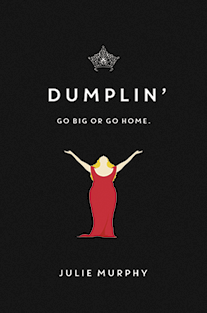
The National Bullying Helpline website provides support and advice for both children and adults on how to handle✚ bullying. It offers guidance on dealing with various forms of bullying and strategies for seeking help.
NATIONAL Bullying Helpline. Available at: https://s.livro.pro/6edqfk. Accessed on: Sept. 11th, 2024.
The film Wonder tells the story of August Pullman, a boy with a facial deformity who faces the challenge of going to a regular school. Auggie goes through the journey of acceptance, empathy and the impact of kindness, showing how he deals with bullying, makes friends and transforms the lives of his family and community.
WONDER, by Stephen Chbosky. United States: Lionsgate, 2017 (113 minutos).

Explore beauty and classical art by visiting museums and getting to know paintings, sculptures and artistic expressions from different periods. These spaces help us understand how classical artists conveyed✚ emotions and cultural values. In Brazil, visit the Pinacoteca of São Paulo, which boasts✚ a vast collection of classical and modern art.
PINACOTECA de São Paulo. Available at: https://s.livro.pro/8668qm. Accessed on: Aug. 14th, 2024.